Dry skin is a prevalent dermatological concern that affects people of all ages and backgrounds. This condition occurs when the skin lacks sufficient moisture, leading to discomfort, flakiness, and sometimes irritation. Beyond external factors like weather conditions and skincare routines, the role of internal factors, particularly nutrition, is gaining recognition in addressing dry skin issues. This article explores the connection between nutrition, specifically the intake of essential vitamins, and the promotion of healthy, hydrated skin.
The Common Issue of Dry Skin
Dry skin is a widespread problem, impacting millions of individuals globally. Factors such as environmental conditions (cold or dry climates), excessive bathing, and the use of harsh skincare products contribute to the loss of skin moisture. The result is often discomfort, itchiness, and a dull complexion. Understanding the root causes of dry skin is crucial for developing effective strategies to address and prevent this common concern.
The Impact of Nutrition on Skin Health
The saying “you are what you eat” holds true when it comes to skin health. Nutrition plays a pivotal role in maintaining the skin’s integrity and function. The foods we consume provide the essential building blocks for skin cells, and deficiencies in key nutrients can manifest as various skin issues, including dryness. Exploring the connection between dietary choices and skin health unveils the potential to influence and improve skin conditions from the inside out.
Role of Vitamins in Combating Dry Skin
Vitamins are essential micronutrients that contribute significantly to skin health. Certain vitamins play key roles in maintaining skin moisture, promoting elasticity, and preventing dryness. Understanding the specific functions of these vitamins allows individuals to make informed choices about their diet and supplementation to support overall skin well-being. The following sections will delve into the importance of specific vitamins, such as Vitamin A, E, C, D, and B-complex, in combating dry skin and promoting optimal skin health.
Table of Contents:
- Vitamin A: The Skin-Revitalizing Power
- Vitamin E: An Antioxidant Shield for Dry Skin
- Vitamin C: Collagen Boost for Hydrated Skin
- Vitamin D: Sunshine Vitamin for Skin Moisture
- B Vitamins: Complex Support for Skin Hydration
- Omega-3 Fatty Acids: Essential for Supple Skin
- Hydration and Water Intake
- Lifestyle Tips for Combating Dry Skin
- FAQ: The Best Vitamins for Dry Skin
- Conclusion
Vitamin A: The Skin-Revitalizing Power
Mad Hippie Vitamin A
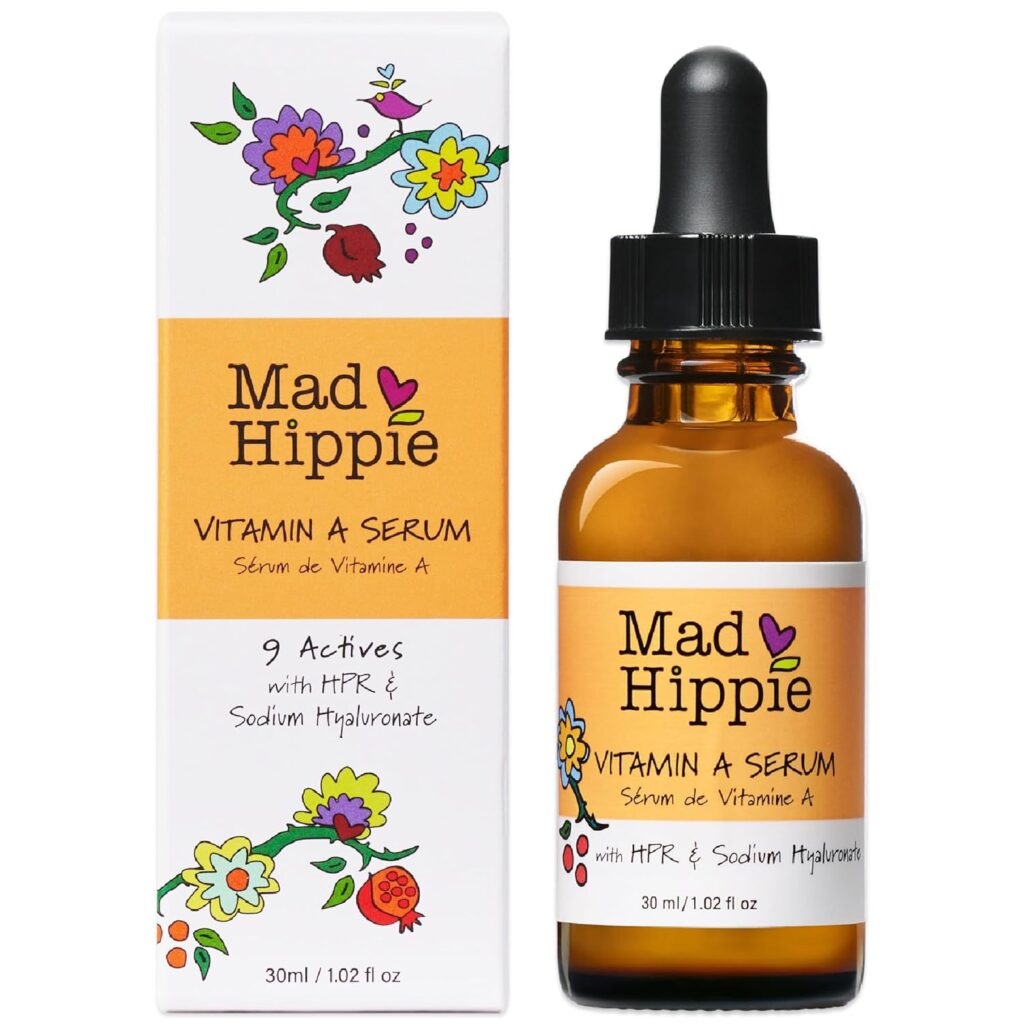
Mad Hippie Vitamin A Serum is a skincare product designed to promote skin renewal and combat the signs of aging. Formulated with a blend of natural and active ingredients, this serum aims to enhance skin texture, reduce the appearance of wrinkles, and improve overall skin tone.
Pros:
- Retinol Alternative: Mad Hippie Vitamin A Serum utilizes a form of Vitamin A called HPR (Hydroxypinacolone Retinoate), considered a gentle and potentially less irritating alternative to traditional retinol.
- Antioxidant-Rich Formula: Packed with antioxidants like chamomile extract, clary sage, and green tea, the serum helps protect the skin from environmental damage and oxidative stress.
- Natural Ingredients: The product boasts a commitment to natural and clean beauty, with a list of ingredients that includes beneficial components like aloe vera, oat beta-glucan, and essential oils.
- Cruelty-Free and Vegan: Mad Hippie is known for its cruelty-free and vegan-friendly approach, making it a choice for those who prioritize ethical and sustainable skincare.
- Lightweight Texture: Users often appreciate the lightweight and non-greasy texture of the serum, making it suitable for various skin types, including oily and combination skin.
- Positive Reviews: Many users report improvements in skin texture, reduced fine lines, and a more radiant complexion after consistent use of the product.
Cons:
- Pricier Option: Compared to some other Vitamin A serums on the market, Mad Hippie’s product falls into a slightly higher price range, which may be a consideration for budget-conscious consumers.
- Potential Sensitivity: While HPR is considered less irritating than traditional retinol, some users may still experience sensitivity or redness, particularly if they have very sensitive skin. It’s advisable to perform a patch test before widespread use.
- Effectiveness Varies: As with any skincare product, individual responses can vary. While many users see positive results, some may not experience the same level of improvement in skin texture or appearance of fine lines.
- Packaging: The serum is packaged in a clear glass bottle, which, while aesthetically pleasing, may not be the most ideal for preserving the stability of certain active ingredients that can degrade with exposure to light.
Conclusion:
Mad Hippie Vitamin A Serum offers a natural and cruelty-free option for those seeking the benefits of Vitamin A without the potential drawbacks of traditional retinol. While it may be pricier than some alternatives, positive reviews and a commitment to clean beauty make it a product worth considering for individuals focused on both efficacy and ethical skincare.
Vitamin A is a powerhouse nutrient crucial for maintaining healthy skin. It serves several vital functions that contribute to skin revitalization. One primary role is the promotion of cell turnover and regeneration. Vitamin A aids in the production of new skin cells, helping to replace old, damaged ones. This process is essential for maintaining skin texture, preventing dry patches, and fostering a radiant complexion.
Additionally, Vitamin A is renowned for its ability to regulate sebum production. Adequate sebum levels are essential for maintaining skin hydration, as it forms a natural barrier that prevents moisture loss. By controlling sebum production, Vitamin A helps strike a balance, preventing both excessive dryness and oiliness.
Moreover, Vitamin A is an antioxidant, protecting the skin from oxidative stress caused by free radicals. This antioxidant property helps prevent premature aging and contributes to the overall resilience of the skin.
Food Sources Rich in Vitamin A
Incorporating Vitamin A-rich foods into one’s diet is an effective way to support skin health. Some notable sources of Vitamin A include:
- Orange and Yellow Vegetables: Carrots, sweet potatoes, and pumpkins are rich in beta-carotene, a precursor to Vitamin A.
- Leafy Greens: Spinach, kale, and collard greens are excellent sources of Vitamin A.
- Animal Products: Liver, eggs, and dairy products provide readily absorbable forms of Vitamin A.
- Fruits: Mangoes, apricots, and cantaloupes contain beta-carotene.
- Fish: Certain fatty fish like salmon and mackerel provide Vitamin A.
Recommended Daily Intake for Healthy Skin
The recommended daily intake of Vitamin A varies based on age, sex, and life stage. For adults, the recommended dietary allowances (RDAs) are typically around 700 to 900 micrograms of retinol activity equivalents (RAE). It’s important to note that excessive intake of Vitamin A can have adverse effects, so it’s advisable to obtain it through a balanced diet or consult with a healthcare professional before considering supplements. Achieving the recommended intake supports not only skin health but also contributes to overall well-being.
Vitamin E: An Antioxidant Shield for Dry Skin
Cliganic 100% Pure Vitamin E
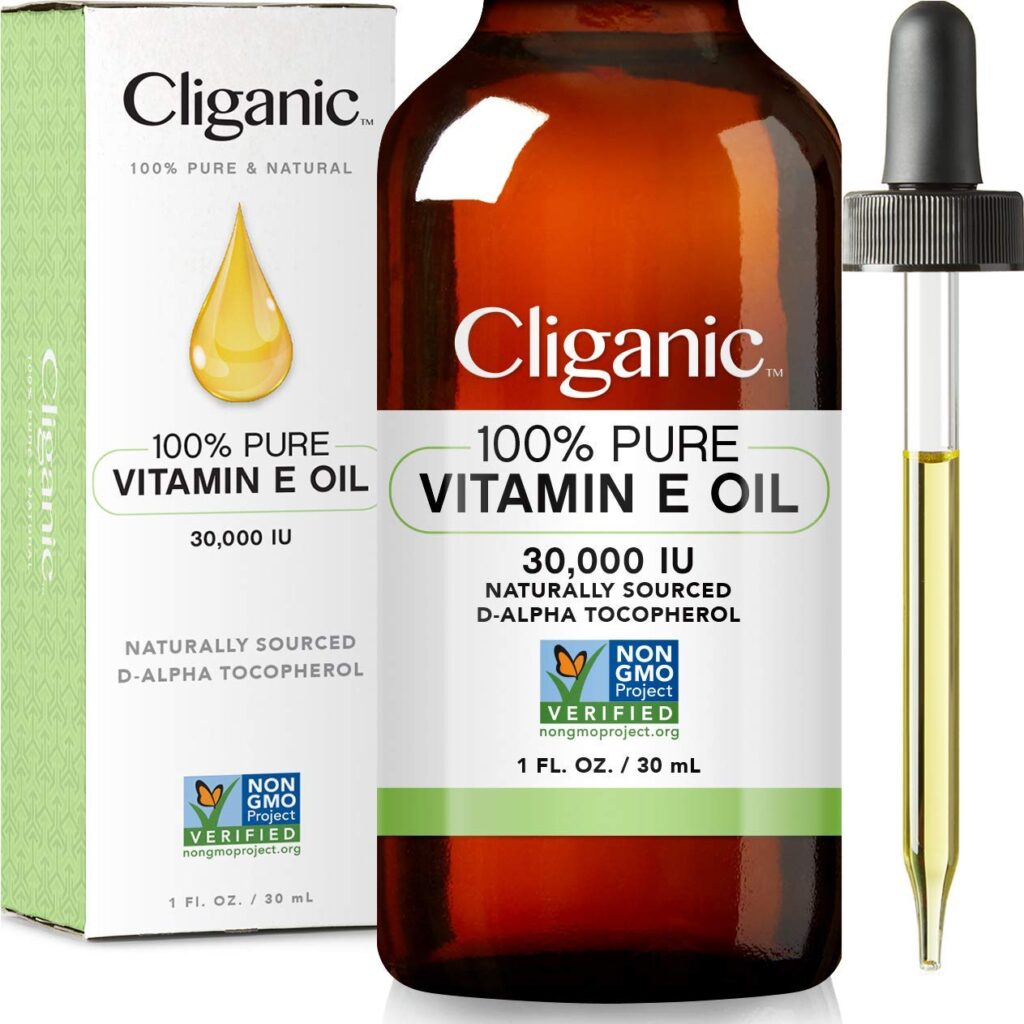
Cliganic 100% Pure Vitamin E Oil is a skincare product formulated with Vitamin E, a powerful antioxidant known for its potential benefits in promoting skin health. This oil is designed for topical use, aiming to moisturize the skin, reduce the appearance of scars and stretch marks, and provide antioxidant protection.
Pros:
- Pure Vitamin E: As the name suggests, Cliganic’s product is composed of 100% pure Vitamin E oil. This purity ensures that users are getting the full benefits of Vitamin E without dilution or additional ingredients.
- Versatile Use: The oil can be applied to various areas of the body, making it versatile for addressing dry skin, scars, stretch marks, and providing general skincare support.
- Moisturizing Properties: Vitamin E is known for its moisturizing effects on the skin. This oil can help hydrate and soothe dry, flaky skin, leaving it feeling softer and more supple.
- Antioxidant Benefits: Vitamin E is an antioxidant that helps protect the skin from free radical damage, which can contribute to premature aging. Regular use may contribute to a more youthful and radiant complexion.
- Cruelty-Free and Vegan: Cliganic emphasizes its commitment to cruelty-free and vegan-friendly products, making it a suitable option for those who prioritize ethical and sustainable skincare.
- Portable Packaging: The product comes in a small, convenient bottle, making it easy to carry and apply on the go.
Cons:
- Viscous Texture: Some users may find the oil to be thick or viscous, which can make application a bit challenging, especially for those who prefer lighter textures.
- Scent: While the product is advertised as fragrance-free, some users have reported a subtle scent that may be noticeable upon application. Individuals sensitive to scents may want to perform a patch test.
- Potential Skin Sensitivity: Vitamin E can cause skin irritation or allergies in some individuals. It’s advisable to perform a patch test before applying the oil to larger areas, especially for those with sensitive skin.
- Price: Compared to other Vitamin E oils on the market, Cliganic’s product falls into a mid-to-high price range, which may be a consideration for budget-conscious consumers.
Conclusion:
Cliganic 100% Pure Vitamin E Oil is a straightforward and pure option for those seeking the specific benefits of Vitamin E for their skincare routine. Its versatility and purity make it suitable for various skin concerns, but individuals should be mindful of the oil’s texture and potential skin sensitivity. Overall, it is a viable choice for those prioritizing a simple yet effective Vitamin E oil for their skincare needs.
Vitamin E is a potent antioxidant that plays a crucial role in shielding the skin from oxidative stress and combating the effects of free radicals. As an antioxidant, Vitamin E neutralizes free radicals—unstable molecules that can damage skin cells and contribute to premature aging. By preventing oxidative damage, Vitamin E helps maintain the integrity of the skin, reducing the likelihood of dryness, fine lines, and wrinkles.
Furthermore, Vitamin E supports the immune system, contributing to the skin’s ability to resist infections and recover from damage. Its anti-inflammatory properties also assist in soothing irritated skin, making it a valuable component in addressing dryness caused by inflammation.
Incorporating Vitamin E into Your Diet
Including Vitamin E-rich foods in your diet is an effective way to enhance skin health from within. Some excellent sources of Vitamin E include:
- Nuts and Seeds: Almonds, sunflower seeds, and hazelnuts are rich in Vitamin E.
- Vegetable Oils: Sunflower oil, wheat germ oil, and olive oil contain significant amounts of Vitamin E.
- Green Leafy Vegetables: Spinach and kale are not only high in Vitamin A but also provide Vitamin E.
- Fruits: Avocado and kiwi are fruits that contribute to Vitamin E intake.
- Fortified Foods: Some cereals and other fortified foods may contain added Vitamin E.
Topical Application of Vitamin E for Skin Hydration
In addition to dietary intake, topical application of Vitamin E can directly benefit dry skin. Vitamin E oil or creams containing Vitamin E can be applied to the skin to enhance hydration. Its moisturizing properties help soothe and replenish dry, flaky skin, promoting a smoother and more supple complexion.
When applied topically, Vitamin E also assists in protecting the skin from environmental factors, such as UV rays and pollution, which can contribute to dryness and premature aging. Including Vitamin E in your skincare routine provides an additional layer of defense against external stressors, ensuring comprehensive support for dry skin. However, individuals with sensitive skin should perform a patch test before widespread use to avoid potential adverse reactions.
Vitamin C: Collagen Boost for Hydrated Skin
TruSkin Vitamin C Face Serum
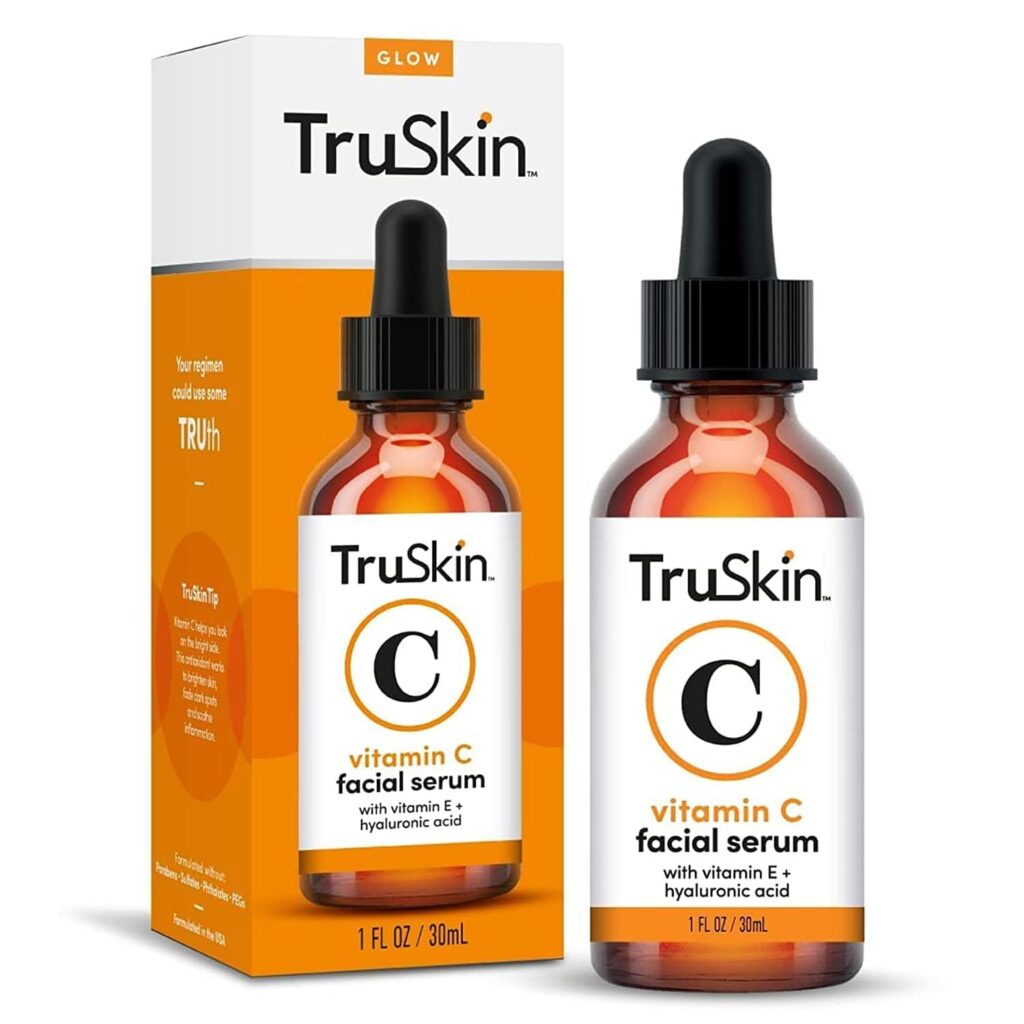
TruSkin Vitamin C Face Serum is a popular skincare product designed to harness the benefits of Vitamin C for the skin. Formulated with a blend of natural and botanical ingredients, this serum aims to brighten the complexion, reduce the appearance of fine lines and wrinkles, and provide overall skin nourishment.
Pros:
- High Potency Vitamin C: The serum contains a potent form of Vitamin C (Sodium Ascorbyl Phosphate), known for its antioxidant properties that can help brighten the skin, even out tone, and protect against environmental damage.
- Hydrating Ingredients: In addition to Vitamin C, the serum includes Hyaluronic Acid, which is known for its hydrating properties. This combination can contribute to improved skin moisture and plumpness.
- Natural and Organic Ingredients: TruSkin emphasizes the use of natural and organic ingredients, including Aloe Vera, Witch Hazel, and Jojoba Oil, making it appealing to those who prefer clean and conscious skincare.
- Cruelty-Free and Vegan: The product is cruelty-free and vegan-friendly, aligning with ethical and sustainable skincare practices.
- Positive Customer Reviews: Many users report positive results, including brighter skin, reduced hyperpigmentation, and improved overall skin texture.
- Affordable: Compared to some high-end Vitamin C serums, TruSkin’s product is relatively affordable, providing accessibility to a broader range of consumers.
Cons:
- Scent: Some users report that the serum has a distinct scent, which may be noticeable upon application. Individuals sensitive to scents may want to perform a patch test.
- Texture: While many users find the texture of the serum pleasant, some individuals with oilier skin may find it a bit sticky. It’s recommended to allow the serum to fully absorb before applying additional products.
- Effectiveness Varies: As with any skincare product, individual responses can vary. While many users see positive results, some may not experience the same level of improvement in skin tone or texture.
- Packaging: The serum is packaged in a clear bottle, which, while aesthetically pleasing, may expose the product to light and air, potentially impacting the stability of certain active ingredients over time.
Conclusion:
TruSkin Vitamin C Face Serum is a popular and affordable option for those seeking the benefits of Vitamin C in their skincare routine. With a focus on natural ingredients and positive customer reviews, it is a viable choice for brightening and hydrating the skin. However, individuals should be mindful of the scent and texture, and those with specific skin concerns may want to perform a patch test before widespread use.
Vitamin C, also known as ascorbic acid, is a vital nutrient with multifaceted benefits for the skin, particularly in the context of collagen production. Collagen is a structural protein crucial for maintaining skin elasticity, firmness, and hydration. Vitamin C plays a pivotal role in collagen synthesis by promoting the formation of collagen fibers and assisting in the stabilization of collagen molecules. As a result, adequate Vitamin C intake is essential for maintaining skin integrity and preventing dryness and premature aging.
Moreover, Vitamin C is a potent antioxidant that helps protect the skin from free radical damage caused by sun exposure and environmental pollutants. By neutralizing free radicals, Vitamin C contributes to the prevention of oxidative stress, supporting overall skin health.
Fruits and Vegetables High in Vitamin C
- Incorporating Vitamin C-rich foods into your diet is a natural and effective way to promote skin hydration. Some notable sources of Vitamin C include:
- Citrus Fruits: Oranges, grapefruits, lemons, and limes are rich in Vitamin C.
- Berries: Strawberries, blueberries, raspberries, and blackberries are excellent sources of Vitamin C.
- Kiwi: This small, green fruit is a powerhouse of Vitamin C.
- Bell Peppers: Particularly red and yellow peppers contain high levels of Vitamin C.
- Leafy Greens: Spinach and kale not only provide Vitamin A and E but also contribute to Vitamin C intake.
Enhancing Skin Elasticity and Moisture with Vitamin C
Vitamin C enhances skin elasticity and moisture retention by supporting collagen structure. Collagen fibers are essential for maintaining the skin’s structural integrity, and adequate levels of Vitamin C contribute to the synthesis of collagen, promoting a firm and hydrated complexion.
Additionally, Vitamin C helps brighten the skin by inhibiting melanin production, reducing the appearance of dark spots and uneven skin tone. Its anti-inflammatory properties also aid in calming irritated skin, making it beneficial for those with dry, sensitive skin.
In skincare routines, Vitamin C serums and creams are popular for their ability to provide targeted benefits. These products can be applied topically to the skin, delivering concentrated Vitamin C to address specific concerns such as dryness, dullness, and signs of aging. Regular use of Vitamin C-rich products can contribute to a more hydrated, radiant, and youthful-looking complexion.
Vitamin D: Sunshine Vitamin for Skin Moisture
GIVOL Vitamin D3
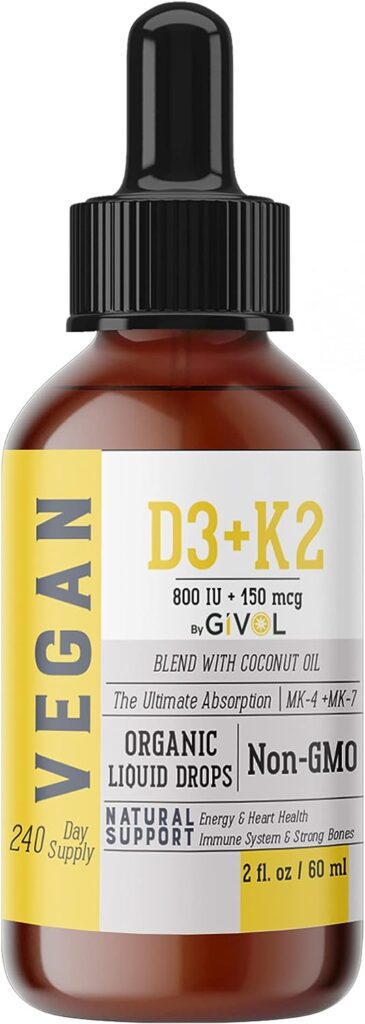
GIVOL Vitamin D3 is a dietary supplement formulated to provide a convenient and plant-based source of Vitamin D. Promoted as an organic, fractionated, and plant-based product, it is designed to support bone health, immune function, and overall well-being.
Pros:
- Plant-Based and Organic: GIVOL Vitamin D3 is advertised as a plant-based and organic supplement, making it suitable for individuals with dietary restrictions or those who prefer plant-derived products.
- Liquid Formulation: The supplement comes in liquid form, which can be more convenient for those who have difficulty swallowing pills. The liquid format also allows for easier dosage adjustment.
- Suitable for Children: The product is marketed as suitable for children, providing an option for families looking for a Vitamin D supplement for both adults and kids.
- Fractionated for Absorption: The term “fractionated” suggests a process that breaks down the Vitamin D3 into smaller particles, potentially enhancing absorption in the body.
- Free from Common Allergens: The supplement is promoted as free from common allergens such as gluten, soy, and dairy, accommodating individuals with sensitivities.
- Easy-to-Use Dropper: The dropper included in the packaging makes it easy to measure and administer the desired dosage, allowing for precise control over supplement intake.
Cons:
- Flavor Consideration: While the product is designed to be flavorless, some users may still detect a subtle taste. This could be a consideration for individuals with heightened taste sensitivities.
- Effectiveness May Vary: Individual responses to supplements can vary, and some individuals may not experience the same level of effectiveness. Results may depend on factors such as individual health, lifestyle, and existing Vitamin D levels.
- Pricing: Compared to traditional Vitamin D supplements, plant-based options can sometimes be more expensive. The pricing may be a factor for budget-conscious consumers.
- Limited Information on Fractionation Process: The term “fractionated” is used without detailed information about the specific process involved. Some consumers may prefer more transparency about the production methods used.
Conclusion:
GIVOL Vitamin D3 offers a plant-based, liquid alternative for individuals seeking a convenient and potentially more absorbable form of Vitamin D. The product’s suitability for children and absence of common allergens make it a versatile option. However, individual preferences regarding taste and budget considerations should be taken into account when considering this supplement. As with any dietary supplement, consulting with a healthcare professional before adding it to your routine is advisable.
Vitamin D is often referred to as the “sunshine vitamin” because of its unique synthesis process in the skin when exposed to sunlight. This vitamin plays a crucial role in maintaining overall skin health, and its impact on skin moisture is particularly noteworthy. The connection between Vitamin D and skin health lies in its ability to regulate the proliferation and differentiation of skin cells. This regulation is essential for the maintenance of a healthy skin barrier, which, in turn, helps prevent excessive moisture loss and dryness.
Furthermore, Vitamin D has anti-inflammatory properties, which can contribute to soothing dry and irritated skin conditions. It plays a role in modulating the immune response, potentially reducing the severity of inflammatory skin conditions associated with dryness.
Sun Exposure and Natural Vitamin D Synthesis
The primary natural source of Vitamin D is sunlight. When the skin is exposed to ultraviolet B (UVB) rays from the sun, a precursor to Vitamin D is synthesized in the skin. This precursor undergoes further processes in the liver and kidneys to become active Vitamin D. Adequate sun exposure, usually around 10-30 minutes a few times per week, is generally sufficient for the body to produce an optimal amount of Vitamin D.
It’s important, however, to balance sun exposure to avoid negative effects such as sunburn and skin damage. Individuals with limited sun exposure or those living in areas with minimal sunlight may consider Vitamin D supplements or dietary sources to ensure sufficient intake.
Dietary Sources of Vitamin D for Dry Skin Relief
While sunlight is the primary source, certain foods also provide Vitamin D. Including these foods in your diet can contribute to overall skin health and provide relief for dry skin:
- Fatty Fish: Salmon, mackerel, and sardines are excellent sources of Vitamin D.
- Egg Yolks: Eggs, especially the yolk, contain Vitamin D.
- Fortified Foods: Some foods, such as fortified dairy products, orange juice, and cereals, are enriched with Vitamin D.
Ensuring an adequate intake of Vitamin D, either through sun exposure or dietary sources, supports the skin’s ability to maintain moisture and overall health. However, it’s crucial to strike a balance, as excessive sun exposure can have adverse effects on the skin. Individuals with concerns about Vitamin D levels or those with limited sun exposure may benefit from consulting with a healthcare professional to determine appropriate supplementation.
B Vitamins: Complex Support for Skin Hydration
Nature Made Vitamin B12
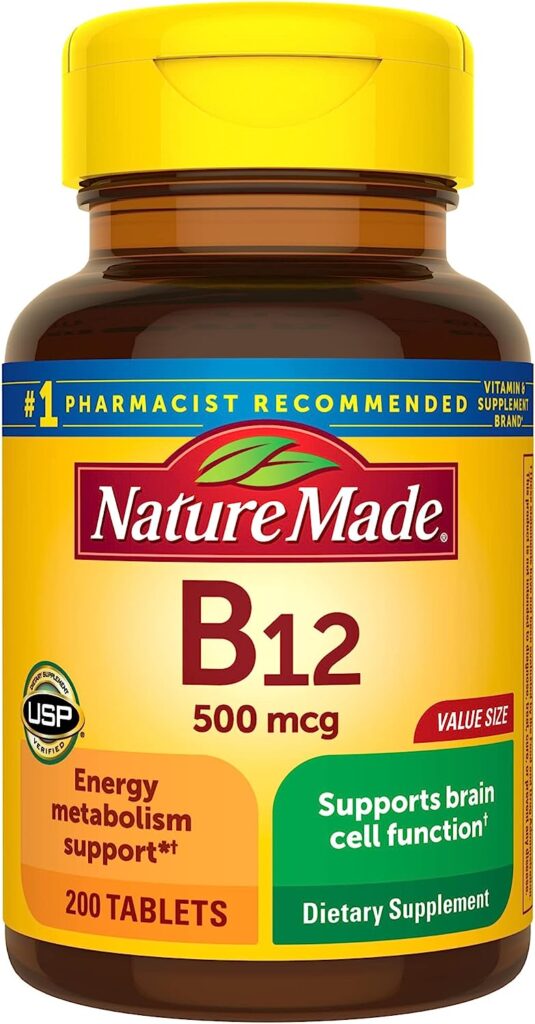
Nature Made Vitamin B12 is a dietary supplement formulated to provide a convenient source of Vitamin B12, an essential nutrient that plays a crucial role in energy metabolism, red blood cell formation, and neurological function. The product comes in tablet form and is designed to support overall health and well-being.
Pros:
- Essential Nutrient Support: Vitamin B12 is vital for various bodily functions, including energy metabolism, DNA synthesis, and neurological health. Nature Made aims to provide a reliable source of this essential nutrient.
- Tablet Form: The supplement is in tablet form, which can be convenient for individuals who prefer a pill format over capsules or liquid supplements.
- Value Size Packaging: The product is available in a value size packaging, providing a larger quantity of tablets per container. This can be advantageous for those who prefer to purchase in bulk.
- No Artificial Colors or Preservatives: Nature Made emphasizes the absence of artificial colors or preservatives in their Vitamin B12 supplement, catering to individuals who prioritize clean and minimal ingredient formulations.
- Budget-Friendly: Compared to some specialized or premium vitamin brands, Nature Made is often more budget-friendly, offering a cost-effective option for those looking for a reliable source of Vitamin B12.
Cons:
- Tablet Size: Some users may find the tablets larger or harder to swallow compared to other forms of supplements. This can be a consideration for individuals who have difficulty swallowing pills.
- No Sublingual Option: Unlike sublingual or dissolvable forms of Vitamin B12, this tablet must be swallowed, which may not be preferable for those who have difficulty with oral administration or prefer alternative delivery methods.
- Potential Additives: While the product advertises no artificial colors or preservatives, it does contain other ingredients, such as cellulose and stearic acid, which may be of concern to individuals seeking minimal additives.
- Individual Absorption Variances: Some individuals may have difficulty absorbing Vitamin B12, especially if they have certain medical conditions that affect absorption. In such cases, alternative forms of supplementation or medical advice may be necessary.
Conclusion:
Nature Made Vitamin B12 offers a straightforward and budget-friendly option for individuals seeking to supplement their Vitamin B12 intake. The tablet form and value size packaging make it convenient for regular use. However, considerations such as tablet size and individual absorption capabilities should be taken into account. As with any dietary supplement, consulting with a healthcare professional is advisable, especially for individuals with specific health concerns or conditions.
Biotin, also known as Vitamin B7, is a water-soluble B-vitamin that plays a significant role in promoting skin health and moisture. Biotin is crucial for the synthesis of fats, amino acids, and glucose, all of which contribute to maintaining healthy skin cells. Specifically, Biotin supports the formation of fatty acids, which are essential components of the skin’s lipid barrier. A robust lipid barrier helps retain moisture, preventing dryness and promoting overall skin hydration.
Furthermore, Biotin has been associated with improved skin elasticity, helping to maintain a youthful appearance. While Biotin deficiencies are rare, incorporating biotin-rich foods or supplements can be beneficial for individuals looking to support skin health.
Niacin (Vitamin B3) and its Role in Skin Health
Niacin, or Vitamin B3, is another B-complex vitamin with notable benefits for skin health. One of its key functions is in the maintenance of a healthy skin barrier. Niacin helps improve the skin’s ability to retain moisture by boosting the production of ceramides, which are lipids that play a crucial role in skin hydration and protection.
Moreover, Niacin has anti-inflammatory properties, making it beneficial for those with dry and irritated skin conditions. By reducing inflammation, Niacin contributes to alleviating redness and promoting an overall smoother complexion.
Incorporating B Vitamins into Your Diet
Incorporating a variety of B vitamins into your diet is essential for comprehensive skin support. Some B-vitamins, in addition to Biotin and Niacin, include:
- B6 (Pyridoxine): Involved in the production of collagen, which contributes to skin elasticity.
- B12 (Cobalamin): Supports cell reproduction, including skin cells, promoting a healthy complexion.
- Folate (Vitamin B9): Important for DNA synthesis and repair, contributing to overall skin health.
To ensure you get an adequate supply of B vitamins, include a variety of foods in your diet such as:
- Whole Grains: Brown rice, quinoa, and oats are rich in various B vitamins.
- Leafy Greens: Spinach and kale provide B vitamins, including folate.
- Meat and Fish: Lean meats, poultry, and fish like salmon and tuna are good sources of B vitamins.
- Dairy Products: Milk, yogurt, and cheese contain B vitamins, including Biotin.
By maintaining a well-balanced diet that includes a variety of B vitamins, you provide your skin with the necessary nutrients to support hydration, elasticity, and overall health. Additionally, if dietary intake is insufficient, B-complex supplements can be considered under the guidance of a healthcare professional.
Omega-3 Fatty Acids: Essential for Supple Skin
NOW Supplements, Ultra Omega-3
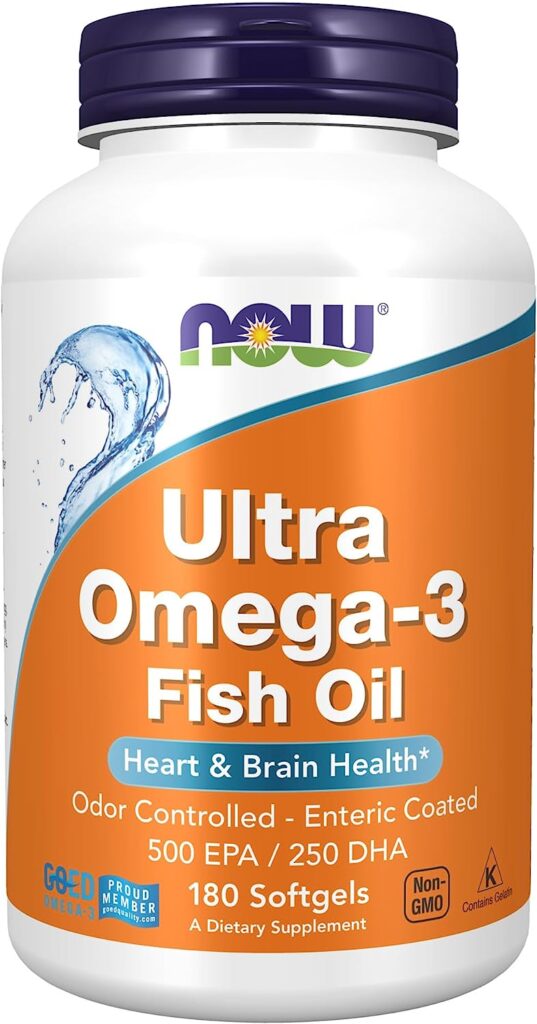
NOW Supplements, Ultra Omega-3, is a dietary supplement that provides a concentrated source of omega-3 fatty acids derived from fish oil. Omega-3 fatty acids, particularly EPA (eicosapentaenoic acid) and DHA (docosahexaenoic acid), are essential for cardiovascular health, brain function, and overall well-being. The softgel capsules are designed for easy consumption.
Pros:
- High Concentration of Omega-3s: The supplement offers a high concentration of omega-3 fatty acids, including EPA and DHA. These fatty acids are well-known for their cardiovascular and cognitive health benefits.
- Purity and Quality Assurance: NOW Supplements emphasizes the purity and quality of their product. The fish oil undergoes molecular distillation to remove contaminants, ensuring a clean and safe supplement.
- Enteric Coating: The softgel capsules are enteric-coated, which may help reduce the likelihood of fishy aftertaste or burps often associated with fish oil supplements.
- Supports Heart and Brain Health: Omega-3 fatty acids play a crucial role in supporting heart health by promoting healthy cholesterol levels and maintaining cardiovascular function. Additionally, DHA is essential for brain function and development.
- Third-Party Testing: NOW Supplements conducts third-party testing to verify the potency and purity of their products. This commitment to transparency can instill confidence in consumers regarding the quality of the supplement.
- No Artificial Additives: The supplement is free from artificial colors, flavors, and preservatives, catering to those who prefer a more natural product.
Cons:
- Fishy Aftertaste: Despite the enteric coating, some users may still experience a fishy aftertaste or burps. This is a common issue with many fish oil supplements and varies among individuals.
- Large Capsule Size: The softgel capsules are relatively large, which may be challenging for individuals who have difficulty swallowing pills.
- Fish Allergy Concerns: Individuals with fish allergies should exercise caution when considering fish oil supplements, even those that have undergone purification processes. It’s advisable to consult with a healthcare professional if there are concerns about potential allergic reactions.
- Not Suitable for Vegetarians and Vegans: As a fish oil-based supplement, NOW Ultra Omega-3 is not suitable for those following vegetarian or vegan diets.
Conclusion:
NOW Supplements, Ultra Omega-3, provides a concentrated and purified source of omega-3 fatty acids, supporting cardiovascular and cognitive health. The enteric coating and third-party testing add to the appeal of the product. However, potential issues such as capsule size and a fishy aftertaste should be considered. Individuals with specific health concerns or dietary preferences should consult with a healthcare professional before incorporating this supplement into their routine.
Omega-3 fatty acids are essential polyunsaturated fats that play a crucial role in maintaining supple and healthy skin. The benefits of omega-3s for the skin are multifaceted. One primary advantage is their anti-inflammatory properties, which help mitigate skin inflammation and conditions associated with dryness, such as eczema and psoriasis. By reducing inflammation, omega-3s contribute to a calmer and more balanced complexion.
Omega-3 fatty acids also support the skin’s natural barrier function. The lipid layer of the skin, composed of fatty acids, helps retain moisture and prevents water loss. Omega-3s enhance this lipid barrier, promoting skin hydration and preventing dryness.
Moreover, these fatty acids contribute to the production of collagen and elastin, proteins vital for maintaining skin structure and elasticity. By supporting collagen synthesis, omega-3s aid in preventing signs of premature aging, such as fine lines and wrinkles, resulting in a more youthful appearance.
Rich Sources of Omega-3s in Your Diet
Incorporating foods rich in omega-3 fatty acids into your diet is crucial for reaping their skin benefits. Some excellent sources of omega-3s include:
- Fatty Fish: Salmon, mackerel, sardines, and trout are rich in omega-3 fatty acids, particularly EPA (eicosapentaenoic acid) and DHA (docosahexaenoic acid).
- Flaxseeds: Ground flaxseeds and flaxseed oil provide alpha-linolenic acid (ALA), a plant-based omega-3.
- Chia Seeds: Chia seeds are another plant-based source of omega-3s.
- Walnuts: Walnuts contain ALA and can be easily incorporated into various dishes.
- Canola Oil: Canola oil is a cooking oil that contains omega-3 fatty acids.
Supplements and Fish Oil for Dry Skin
For individuals who may struggle to obtain sufficient omega-3s from their diet, supplements can be considered. Fish oil supplements, which typically contain concentrated amounts of EPA and DHA, are widely available. These supplements are convenient and can be a valuable addition for those with dietary restrictions or preferences.
It’s important to consult with a healthcare professional before starting omega-3 supplements, as excessive intake can have side effects and interact with certain medications. Additionally, obtaining nutrients from a diverse and balanced diet remains the foundation for promoting optimal skin health.
Hydration and Water Intake
Water is a fundamental component of overall health, and its importance extends to maintaining skin hydration. The skin, being the body’s largest organ, relies on proper hydration to function optimally. Water is essential for various physiological processes that directly impact the skin, including nutrient transport, temperature regulation, and waste elimination.
Proper hydration is particularly crucial for the skin’s appearance and function. When adequately hydrated, the skin appears plump, radiant, and more youthful. On the contrary, insufficient water intake can lead to dehydration, causing the skin to become dry, flaky, and prone to irritation. Dehydrated skin is also more susceptible to the development of fine lines and wrinkles.
Tips for Staying Hydrated for Healthy Skin
Ensuring adequate water intake is a simple yet powerful strategy for promoting skin health. Here are some tips to stay hydrated for healthy skin:
- Regular Water Consumption: Aim for at least 8 glasses (64 ounces) of water per day. Adjust this amount based on factors such as physical activity, climate, and individual needs.
- Incorporate Hydrating Foods: Certain fruits and vegetables have high water content and contribute to hydration. Examples include watermelon, cucumber, oranges, and strawberries.
- Limit Dehydrating Beverages: Reduce the consumption of caffeinated and alcoholic beverages, as they can contribute to dehydration. If you consume these beverages, balance them with additional water intake.
- Use a Humidifier: In dry or arid environments, especially during the winter months, using a humidifier can add moisture to the air, preventing excessive evaporation of water from the skin.
- Topical Hydration: Use hydrating skincare products, such as moisturizers and serums, to lock in moisture and support the skin’s natural barrier function.
- Monitor Urine Color: A pale yellow color indicates adequate hydration, while dark yellow or amber may signal dehydration. Pay attention to your urine color as a simple indicator of your hydration status.
- Set Hydration Goals: Establish daily hydration goals and track your water intake using apps or water bottles with volume markers. This can help you stay mindful of your hydration habits.
- Listen to Your Body: Thirst is a clear signal from your body that it needs more water. Pay attention to your thirst cues and respond promptly.
By prioritizing hydration through a combination of water intake, hydrating foods, and topical skincare, you can support the skin’s natural moisture balance, helping to prevent dryness and maintain a healthy, glowing complexion.
Lifestyle Tips for Combating Dry Skin
Moisturizing is a cornerstone in the care routine for combating dry skin, and its significance cannot be overstated. Regular application of a high-quality moisturizer helps replenish the skin’s natural lipid barrier, preventing moisture loss and maintaining hydration. The moisturizer forms a protective layer on the skin, sealing in existing moisture and creating a barrier against external factors.
Opt for moisturizers containing ingredients such as hyaluronic acid, glycerin, and ceramides, as they attract and retain moisture in the skin. Apply moisturizer immediately after bathing or washing your face when the skin is still damp, as this helps lock in moisture more effectively.
Choosing the Right Skincare Products
Selecting the right skincare products is pivotal in addressing and preventing dry skin. Consider the following tips:
- Gentle Cleansers: Use mild, fragrance-free cleansers that do not strip the skin of its natural oils. Harsh cleansers can exacerbate dryness.
- Hypoallergenic Products: Opt for hypoallergenic skincare products to minimize the risk of irritation, especially if you have sensitive skin.
- Avoid Harsh Ingredients: Steer clear of skincare products containing alcohol, retinoids, and harsh exfoliants, as these can contribute to dryness and irritation.
- Humectants: Include products with humectant ingredients like glycerin and hyaluronic acid to attract and retain moisture in the skin.
- Sunscreen: Always use a broad-spectrum sunscreen with at least SPF 30 to protect your skin from UV rays, which can contribute to dryness and premature aging.
Avoiding Harsh Environmental Factors
Protecting your skin from harsh environmental factors is essential for preventing and alleviating dryness. Consider the following:
- Weather Considerations: Cold, windy weather can strip the skin of its natural oils, leading to dryness. During such conditions, use protective clothing and apply a rich moisturizer.
- Humidifiers: In dry indoor environments, especially during the winter months, using a humidifier can add moisture to the air, preventing excessive dryness.
- Hot Showers: While a hot shower may be relaxing, it can contribute to dry skin by stripping away the skin’s natural oils. Opt for lukewarm water and limit shower time.
- Avoiding Irritants: Be mindful of potential irritants, such as harsh laundry detergents and fabric softeners. Opt for fragrance-free and hypoallergenic options.
- Hydration from Within: Ensure adequate water intake to hydrate your skin from the inside out. Proper hydration supports the skin’s natural functions and helps combat dryness.
By adopting these lifestyle tips, you can create a skincare routine that addresses and prevents dry skin, promoting a healthier and more comfortable complexion.
FAQ: The Best Vitamins for Dry Skin
What role do vitamins play in addressing dry skin?
Vitamins play a crucial role in maintaining skin health, and certain vitamins are particularly beneficial for combating dry skin. These vitamins contribute to skin hydration, collagen production, and protection against environmental stressors, collectively promoting a moisturized and healthy complexion.
Which vitamins are most effective for dry skin?
Vitamins A, E, C, D, and various B-complex vitamins are highly effective for addressing dry skin. Each of these vitamins plays a unique role, such as promoting cell turnover, providing antioxidant protection, supporting collagen synthesis, and regulating skin barrier function.
What are good food sources for these vitamins?
Foods rich in these vitamins include:
- Vitamin A: Carrots, sweet potatoes, spinach, and liver.
- Vitamin E: Nuts, seeds, leafy greens, and vegetable oils.
- Vitamin C: Citrus fruits, berries, kiwi, and bell peppers.
- Vitamin D: Fatty fish (salmon, mackerel), egg yolks, and fortified foods.
- B Vitamins: Whole grains, lean meats, dairy products, and leafy greens.
Can supplements help with dry skin?
In some cases, supplements can be beneficial, especially if there are dietary deficiencies. However, it’s important to consult with a healthcare professional before starting any supplements to ensure they are appropriate for your individual needs.
How does hydration impact dry skin?
Hydration is essential for skin health. Drinking an adequate amount of water helps maintain the skin’s natural moisture balance, preventing dryness. Additionally, topical hydration through moisturizers and humectants supports the skin’s barrier function.
Are there specific lifestyle changes to alleviate dry skin?
Yes, lifestyle changes such as regular moisturizing, using gentle skincare products, avoiding harsh environmental factors, and maintaining a balanced diet with the right vitamins and nutrients can significantly alleviate dry skin.
Is there a quick fix for dry skin?
While there may not be an instant solution, consistent and appropriate skincare, proper hydration, and a nutrient-rich diet can lead to noticeable improvements in skin hydration over time.
How often should I consult with a dermatologist for dry skin concerns?
It’s advisable to consult with a dermatologist if you have persistent dry skin concerns, especially if over-the-counter remedies are not providing relief. A dermatologist can assess your skin, identify underlying issues, and recommend targeted treatments.
Conclusion
In conclusion, combatting dry skin requires a holistic and comprehensive approach that addresses both internal and external factors. Understanding the importance of hydration, proper skincare, and a balanced diet enriched with essential vitamins and nutrients is crucial for maintaining radiant and healthy skin. A well-rounded strategy encompasses lifestyle adjustments, mindful product choices, and nutritional considerations to foster an environment that supports optimal skin hydration.
Consultation with Dermatologists and Nutritionists
For personalized guidance in addressing dry skin concerns, consulting with dermatologists and nutritionists is highly recommended. Dermatologists can provide insights into specific skincare routines, recommend suitable products, and offer professional treatments tailored to individual skin types. Nutritionists can assess dietary habits, identify potential deficiencies, and create customized nutrition plans to support skin health from the inside out. Collaborating with these experts ensures a targeted and effective approach to combating dry skin.
Achieving Radiant and Hydrated Skin through Proper Nutrition
Proper nutrition plays a pivotal role in achieving radiant and hydrated skin. Essential vitamins such as A, E, C, D, and various B-complex vitamins, along with omega-3 fatty acids, contribute to the skin’s health, moisture balance, and overall appearance. Including a diverse range of nutrient-rich foods, staying adequately hydrated, and considering supplements when necessary can significantly enhance the skin’s resilience against dryness.
In conclusion, a well-informed combination of lifestyle adjustments, professional guidance, and nutritional choices forms the foundation for achieving and maintaining radiant, hydrated skin. By adopting a proactive and holistic approach, individuals can not only alleviate dry skin concerns but also promote long-term skin health and vitality.

